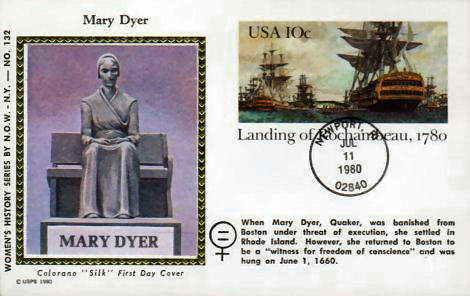![]()
Postal History Introduction
Stampless
Covers
1846
to 1900 Issues
1901-1950
Issues
1951-2003
Issues
Cancels
&
Miscellaneous
Postal
Stationery
Post
Cards
Air
Mail
First
Day &
Event Covers
Parcel Post/Special Delivery
Registered & Official Mail
Commercial & Advertising
Revenue & Postage Due
Wildlife & Game Issues
Complete List of RI Issues
|
Postal Stationary -
Postal Cards |
|
|
|
|
NOW Cachet by Colorano Silk
of
Mary Dyer - Quaker Martyr (Women's History Series) |
|
|
Mary Barrett Dyer was born in the early 1600s in Somersetshire, England. Her martyrdom to her Quaker faith led directly to and helped relieve the persecution of the Quakers in the Massachusetts Bay Colony. Mary Barrett married in 1633 in London to William Dyer and they sailed to the Massachusetts Bay Colony and settled in the Boston area in 1635. Mary attended Anne Hutchinson's meetings and began to accept her antinomian religious views. In 1638 Mary and her husband followed Anne into banishment in Rhode Island and helped to found Portsmouth, Rhode Island. Mary's husband was a leading figure in the new colony. In 1652 Mary and her husband returned to England and Mary became a member of the Society of Friends (Quakers). Upon her return to New England in 1657 she took up missionary work on behalf of the Quakers. Severe anti-Quaker laws had been passed in 1657 and 1658 in the colony and Quakers were being severely persecuted. Mary suffered imprisonment in Boston in 1657 and expulsion from New Haven, Connecticut, in 1658. In 1659 she was again imprisoned briefly in Boston, where she had gone to visit two other imprisoned Friends, and in September of that year she was formally banished, a sentence that carried the threat of execution should she return. Despite the threat of hanging, Mary returned again in October. (Probably by design as she had every intention of becoming a martyr for the cause) She was arrested and condemned, and at the last moment, she was reprieved at the gallows by the intercession of her son and the governors of Connecticut and Nova Scotia. (Two other Quaker acquaintance's of Mary's were hanged that day.) Mary was once again expelled. In May 1660, following her conscience and in defiance of the law, Mary Dyer returned once again to Boston. An appeal to Mary to accept her banishment failed, and she was publicly hanged on June 1, 1660. Her death came to be considered a martyrdom even in Massachusetts, where it hastened the easing of the anti-Quaker statutes. |
![]()
RI Historical Society
The Post Offices
Home Page
RI Tercentenary Issue History
RI Philatelic Society
Recently Added Pages
Philatelic Primer
Rhode Island Around the World
Rhode Island
Town Postmarks
Other Websites of Interest
